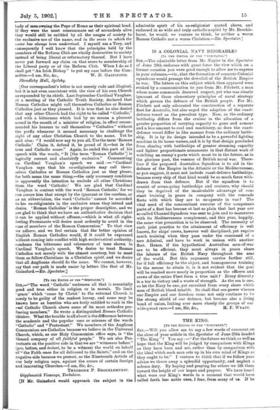rro TEC EDITOR OF THE "SPECTATOR."]
Sin,—" The word ' Catholic ' embraces all that is essentially good and true either in religion or in morals. To limit ' grace ' which came by Christ' to the external Church is surely to be guilty of the rankest heresy, and some may be known here as heretics who are truly entitled to rank in the real Catholic Church above some of its most orthodox pro- fessing members." So wrote a distinguished Roman Catholic thinker. What the trouble is all about is the difference between the academic and the popular uses or misuses of the words "Catholic" and "Protestant." We members of the Anglican Communiom are Catholics because we believe in the Universal Church, which, as our Holy Communion office says, is "the blessed company of all faithful people." We are also Pro- testants on the positive side in that we are "witnesses before" (pro, before, and test an, to be a witness) the world on behalf of "the Faith once for all delivered to the Saints," and on the negative side because we protest, as the Nineteenth Article of our holy religion says, against the errors of certain foreign and innovating Churches.—I am, Sir, &c., [If Mr. Gainsford would approach the subject in the admirable spirit of his co-religionist quoted above, and endorsed in so wide and truly catholic a spirit by Mr. Brockle- hurst, he would, we venture to think, be neither a worse Roman Catholic nor a worse Christian.—En. Spectator.]














































 Previous page
Previous page